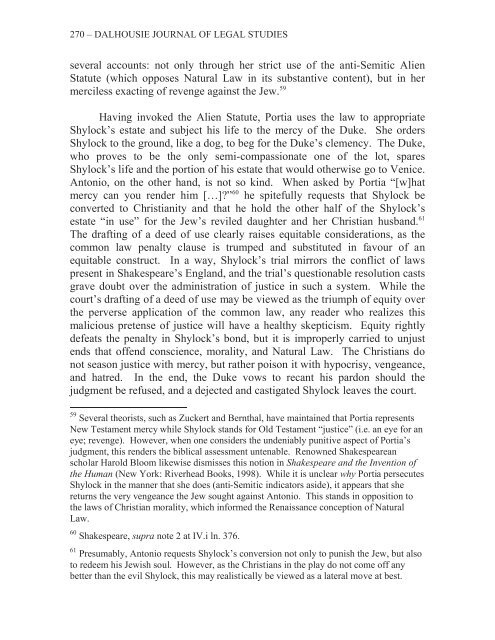(comic) tragedy of formalism in shakespeare's the ... - Goodmans
(comic) tragedy of formalism in shakespeare's the ... - Goodmans
(comic) tragedy of formalism in shakespeare's the ... - Goodmans
You also want an ePaper? Increase the reach of your titles
YUMPU automatically turns print PDFs into web optimized ePapers that Google loves.
270 – DALHOUSIE JOURNAL OF LEGAL STUDIES<br />
several accounts: not only through her strict use <strong>of</strong> <strong>the</strong> anti-Semitic Alien<br />
Statute (which opposes Natural Law <strong>in</strong> its substantive content), but <strong>in</strong> her<br />
merciless exact<strong>in</strong>g <strong>of</strong> revenge aga<strong>in</strong>st <strong>the</strong> Jew. 59<br />
Hav<strong>in</strong>g <strong>in</strong>voked <strong>the</strong> Alien Statute, Portia uses <strong>the</strong> law to appropriate<br />
Shylock’s estate and subject his life to <strong>the</strong> mercy <strong>of</strong> <strong>the</strong> Duke. She orders<br />
Shylock to <strong>the</strong> ground, like a dog, to beg for <strong>the</strong> Duke’s clemency. The Duke,<br />
who proves to be <strong>the</strong> only semi-compassionate one <strong>of</strong> <strong>the</strong> lot, spares<br />
Shylock’s life and <strong>the</strong> portion <strong>of</strong> his estate that would o<strong>the</strong>rwise go to Venice.<br />
Antonio, on <strong>the</strong> o<strong>the</strong>r hand, is not so k<strong>in</strong>d. When asked by Portia “[w]hat<br />
mercy can you render him […]?” 60 he spitefully requests that Shylock be<br />
converted to Christianity and that he hold <strong>the</strong> o<strong>the</strong>r half <strong>of</strong> <strong>the</strong> Shylock’s<br />
estate “<strong>in</strong> use” for <strong>the</strong> Jew’s reviled daughter and her Christian husband. 61<br />
The draft<strong>in</strong>g <strong>of</strong> a deed <strong>of</strong> use clearly raises equitable considerations, as <strong>the</strong><br />
common law penalty clause is trumped and substituted <strong>in</strong> favour <strong>of</strong> an<br />
equitable construct. In a way, Shylock’s trial mirrors <strong>the</strong> conflict <strong>of</strong> laws<br />
present <strong>in</strong> Shakespeare’s England, and <strong>the</strong> trial’s questionable resolution casts<br />
grave doubt over <strong>the</strong> adm<strong>in</strong>istration <strong>of</strong> justice <strong>in</strong> such a system. While <strong>the</strong><br />
court’s draft<strong>in</strong>g <strong>of</strong> a deed <strong>of</strong> use may be viewed as <strong>the</strong> triumph <strong>of</strong> equity over<br />
<strong>the</strong> perverse application <strong>of</strong> <strong>the</strong> common law, any reader who realizes this<br />
malicious pretense <strong>of</strong> justice will have a healthy skepticism. Equity rightly<br />
defeats <strong>the</strong> penalty <strong>in</strong> Shylock’s bond, but it is improperly carried to unjust<br />
ends that <strong>of</strong>fend conscience, morality, and Natural Law. The Christians do<br />
not season justice with mercy, but ra<strong>the</strong>r poison it with hypocrisy, vengeance,<br />
and hatred. In <strong>the</strong> end, <strong>the</strong> Duke vows to recant his pardon should <strong>the</strong><br />
judgment be refused, and a dejected and castigated Shylock leaves <strong>the</strong> court.<br />
59 Several <strong>the</strong>orists, such as Zuckert and Bernthal, have ma<strong>in</strong>ta<strong>in</strong>ed that Portia represents<br />
New Testament mercy while Shylock stands for Old Testament “justice” (i.e. an eye for an<br />
eye; revenge). However, when one considers <strong>the</strong> undeniably punitive aspect <strong>of</strong> Portia’s<br />
judgment, this renders <strong>the</strong> biblical assessment untenable. Renowned Shakespearean<br />
scholar Harold Bloom likewise dismisses this notion <strong>in</strong> Shakespeare and <strong>the</strong> Invention <strong>of</strong><br />
<strong>the</strong> Human (New York: Riverhead Books, 1998). While it is unclear why Portia persecutes<br />
Shylock <strong>in</strong> <strong>the</strong> manner that she does (anti-Semitic <strong>in</strong>dicators aside), it appears that she<br />
returns <strong>the</strong> very vengeance <strong>the</strong> Jew sought aga<strong>in</strong>st Antonio. This stands <strong>in</strong> opposition to<br />
<strong>the</strong> laws <strong>of</strong> Christian morality, which <strong>in</strong>formed <strong>the</strong> Renaissance conception <strong>of</strong> Natural<br />
Law.<br />
60 Shakespeare, supra note 2 at IV.i ln. 376.<br />
61 Presumably, Antonio requests Shylock’s conversion not only to punish <strong>the</strong> Jew, but also<br />
to redeem his Jewish soul. However, as <strong>the</strong> Christians <strong>in</strong> <strong>the</strong> play do not come <strong>of</strong>f any<br />
better than <strong>the</strong> evil Shylock, this may realistically be viewed as a lateral move at best.
















